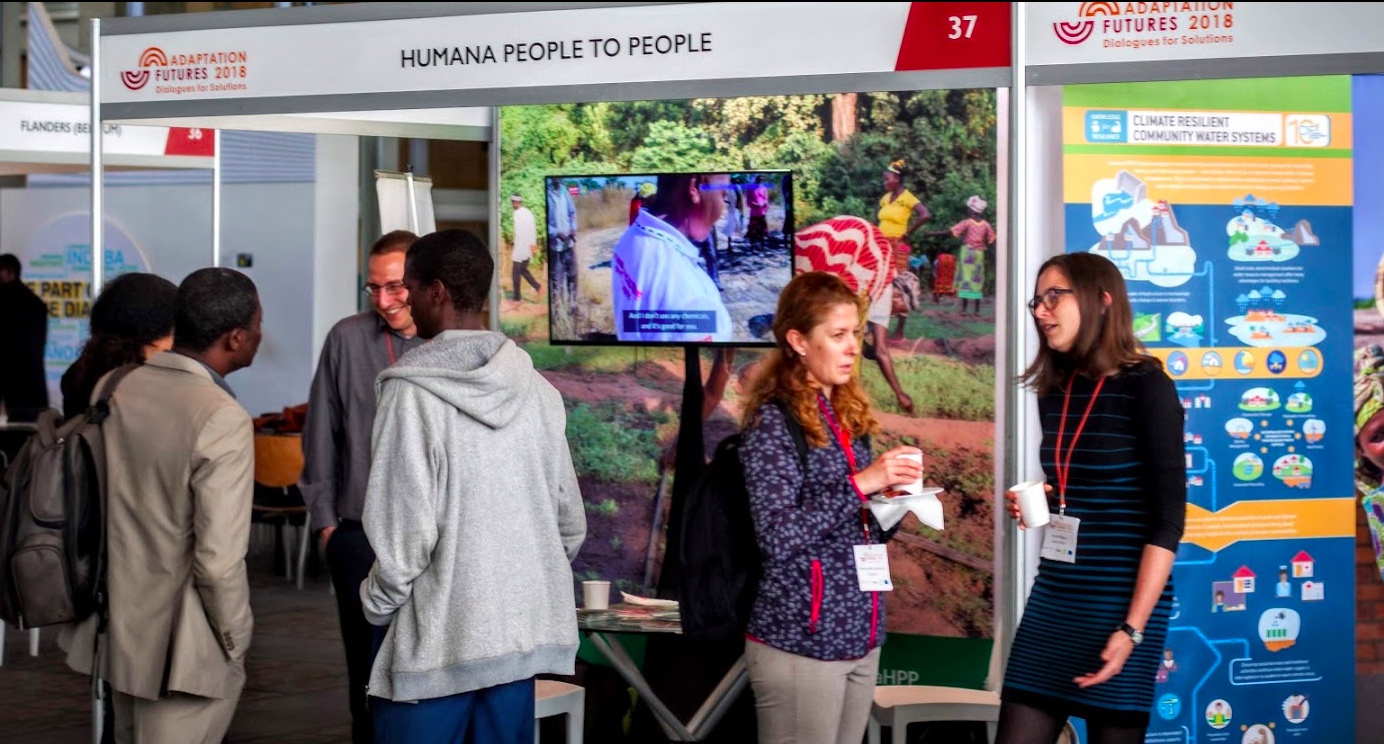Article /
Adaptation Futures 2018: Conference Summary

Introduction
Adaptation Futures 2018*, the fifth in the Adaptation Futures international conference series on global adaptation, was held in CT from 18 to 21 June. The conference aimed to:
- Facilitate dialogue between research and government, civil society, international agencies and business.
- Continue the shift from problem diagnosis to solutions and innovations.
- Link adaptation action to sustainable development, investment and planning.
- Have a strong focus on Africa and the Global South
This is the first time the conference was held on the African continent. This setting was used to foreground developing country adaptation issues and increase developing world participation. Funding was raised to support the access of over 180 sponsored delegates from lower income countries and/or Africa.
In addition to attending sessions delegates were able to view the responses of local artists to the realities of climate change, as well as join in the Community Kraal, which focused on the lived experiences of climate change. The Adaptation Expo showcased the work of 24 organisations actively involved in responding to climate change.
*For more information please visit the conference’s webpage.
Outputs from AF18
- See the full programme of AF18 sessions,while the post conference session overviews can be found here, arranged by session number.
- See all uploaded presentations here, arranged by session number.
- See some of the photos here.
- See the videos of 5 interviews and three plenary sessions here.
- See the videos from the Community Kraal here: https://vimeo.com/album/5351446

Key Messages from Adaptation Futures 2018
- Adaptation is context specific.
- It is vital to put adaptation in the context of people’s lives, taking a holistic view of all risks and existing trends.
- To do: encourage practitioners and researcher interaction.
- Increasing and improved monitoring and evaluation of adaptation is required.
- Evaluation information is necessary to spread best practices, but also to know for whom adaptation is “working” and who is being left out. However, there is no one-size-fits-all set of indicators or methods to measure adaptation.
- Inclusive governance is the basis of adaptation.
- Devolution of authority or more inclusive governance elements can promote positive adaptation outcomes for the most vulnerable. “Communities” are not homogenous entities.
- To do: ensure that research and projects acknowledges diversity and power dynamics within communities and households.
- Adaptation needs local participation.
- Best practices are bottom up, informed by models but not informed by local risk perceptions and priorities and include transparency, co-production, and trust.
- To do: include vulnerable communities in all aspects of adaptation responses, from project planning to designing deliberative spaces where actors can continuously meet to discuss local adaptation efforts.
- Don’t forget the most vulnerable.
- Marginalized groups, specifically, women, those without land rights, and people from minority religions, people living in conflict situations or under difficult governance conditions should not be passed over.
- What is transformation and when is it positive? This was a hot topic at Adaptation Futures 2018 and needs ongoing attention.
AF18 Conference Proceedings
The AF18 Conference Proceedings (download available from the right-hand column) contain 41 extended abstracts that were submitted after the conference to allow the authors to absorb the conference insights into their work.
Suggested citation: Petrik, D., Ashburner, L. 2018. Conference Proceedings of Adaptation Futures 2018. Adaptation Futures 2018. University of Cape Town, Cape Town.
Summary of the key themes
Below are the conference’s key themes. To view the presentations please follow this link. Explore the conference programme here.
- Adaptation and development – How can adaptation lead better development outcomes? In what ways do developmental processes prevent and enhance adaptation outcomes? How does adaptation contribute to the achievement of the SDGs? How can we move adaptation disourse and practice into National Development Plans and other development processes?
- South-South and South-North knowledge and learning – How does a Southern perspective change the global framing of adaptation and development? Are there critiques of Northern approaches to adaptation in research, funding and practice? How do we enhance South-South collaboration; what successes point the way to do this?
- Interaction between climate adaptation with 21st century challenges – How can adaptation thinking be brought into debates and practice around food, water and energy security? What are the solutions for reducing climate risks in the face of rapid urbanisation? What are the implications of migration in the context of climate change and other drivers?
- Modes of collaboration, knowledge co-production and research into use – What are we learning from transdiciplinary and engaged research processes? How do we maximise the uptake of evidence from research and innovations into policy and practice? How do we ‘go the last mile’- from good research, good policy, great ideas to implementation on the ground that leads to real change, for many?
- Financing of adaptation and climate resilient development – What are we learning from the new global, regional and national funding mechanisms, such as the Adaptation and Green Climate Funds? Where are the examples of ‘transformative’ projects that the GCF seeks to fund? What might transformative adaptation look like? How do we measure adaptation?
- Learning from doing – What works and has not worked at different scales, from regional, to national, to local and community? What needs to be in place (enablers) and circumvented (barriers) to maximise the chances of success in different adaptation settings? How do we improve the way learning occurs so that acknowledgement of failure or partial success is valued? How do we implement adaptation across complex social, cultural and political-economic systems?
